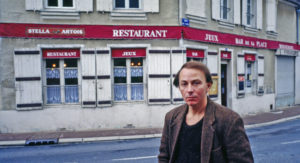Two parliamentary candidates met the other day on the street of my nearest town in Normandy. Both first-time campaigners: one a politics student, aged 22, at the University of Caen; the other 61-years-old and already running the country.
I happened to be standing beside a young man distributing leaflets when Elisabeth Borne, France’s new Prime Minister, and several TV crews approached. You don’t see many TV cameras in Thury Harcourt, in the hills 30 kilometres south of Caen. You don’t see many prime ministers either.
The young man began to berate the PM. Why was she scared to debate with him in public, he asked? Madame Borne put him down politely. “I am very pleased to meet you and I hope that we’re all going to campaign nicely,” she said.
It was only then that I realised that the young man was Noé Gauchard, the local candidate for the Left-Green alliance Nouvelle Union Populaire Ecologique et Sociale (or Nupes for short).
Madame Borne became France’s second female prime minister last week. She is running for election — for the first time in her long career as a public servant — in my home constituency, the sixth circonscription of Calvados. After becoming boss of the Paris Metro, after becoming a regional Prefect in uniform and white gloves, after becoming three kinds of minister during President Emmanuel Macron’s first term, Elisabeth Borne has decided that it is time to get herself elected.
You have to give her credit for that. She doesn’t have to be a member of parliament to be the PM in France. If she wins, she will have to resign the seat and allow her running mate to become the local MP. If she loses, she will have to step down as Prime Minister — not for any legal reason but because Macron has made that the rule for all members of his government who are running in the parliamentary elections on 12 and 19 June. So here, down my way, came an event which could only happen in France: a Prime Minister campaigning for votes for the first time in her life.
How would Elisabeth Borne, a classic product of the French technocracy, take to being a stump politician? She is a fiercely competent and hard-working woman, but is reputed to have little charisma. Her nickname when head of the Paris Metro was “Borne-Out (because she burned out her staff). “She is not a barrel of laughs,” one Macron ally says. “But, then again, government is not the Club Med.”
The Prime Minister spent 45 minutes at the Thury Harcourt Vide-Grenier (attic-clearance sale), which is an occasional opportunity for local people to exchange their unwanted rubbish for other people’s unwanted rubbish. You could buy Johnny Hallyday’s Greatest Hits, Volume 12. Or a casserole with no lid.
I thought that, for a first-timer, she did pretty well. She came over like a hospital matron of the old school doing the rounds of the wards. She has a lovely smile, which is rarely seen on television. She listened for longer than was strictly necessary to complaints about high pump prices or Emmanuel Macron. She was able to connect with people — especially, it seemed, the women. She allowed selfies to be taken with children.
Borne made one beginner’s mistake, however. She didn’t buy anything. A practiced French stump politician visiting a market would always buy something. It doesn’t have to be Johnny Hallyday’s Greatest Hits Volume 12.
***
Borne’s mother was a pharmacist who came from Livarot, a little further east in Calvados. Her father was a Holocaust survivor and resistance hero who never recovered from his wartime trauma and committed suicide when Elisabeth was 11-years-old.
She was brought up in Paris and rose through the ranks of the French meritocracy. She trained as an engineer at France’s premier engineering school, Ecole Polytechnique, whose students — still almost all men to this day — have uniforms and ceremonial swords. She then worked, in increasingly senior roles, in the private offices of a series of Socialist politicians: the culture minister Jack Lang, the Prime Minister, Lionel Jospin, President François Hollande, the mayor of Paris, Bertrand Delanoe. She regarded herself as “of the Left” but never joined the Socialist Party.
She was one of the first women to become a Prefect of a French region, in Poitou-Charentes. During the first Macron presidency, Borne was successively transport, environment and employment minister. She is credited by some (and blamed by the unions and part of the Left) for pushing through two of the most important reforms of the Macron era: the opening of the state French railways to competition and making the terms for unemployment pay tougher (but still more generous than most other EU countries).
Fast forward to Macron’s re-election on 24 April, and she is reported to have been his first choice as Prime Minister. He then spent three weeks looking at other options, all of whom were women. He had decided that, 30 years after the brief and disastrous term of Edith Cresson in 1991-2, it was time for France to have a second female PM.
Macron was torn between choosing a woman with proven experience in national government and one with deep roots in local or regional politics. He is reported by the French media to have almost made another choice, Catherine Vautrin, the centre-right president of the Greater Rheims area in eastern France. But several of his closest aides pointed out that Vautrin had once been a vocal opponent of the legalisation of gay marriage in France. Macron backed away rather than offend his supporters on the centre or the centre-left.
After three weeks, the President returned to his original choice: Elisabeth Borne. This stuttering process — the longest delay before the appointment of a new PM since the present doubled-headed French government system began in 1965 — reveals two things: one about Macron, the other about the changing status of French Prime Ministers.
The first is that Macron, who appears confident, even arrogant, can be indecisive, especially when it comes to choosing people. He is often torn between doing what he thinks will be the right thing and what will be the clever thing.
The second is more profound. It used to be that the Prime Minister was a disposable front-bumper or a fuse to protect the President from being damaged by random events — especially during domestic crises. All the same, the PM used to have a certain amount of autonomy. They were often senior politicians from the President’s own ideological family. They ran the country while the President presided.
But since the seven-year presidential term was reduced to align with the five-year parliamentary term from 2007, the role of the French Prime Minister has become uncertain, even problematic. The semi-detached status of French Presidents is no longer tenable in the age of Twitter and 24-hour TV news. If the President leaves too much to the PM, he is accused of being aloof; if he takes all the decisions, he is accused of being overbearing.
Macron is frequently accused of both. He resented the popularity of his independent-minded, first Prime Minister, Edouard Philippe. He had a much better working relationship with his successor, the hard-working, unassuming but effective Jean Castex. Any French Prime Minister now risks being Prime Minister only in name. He or she no longer leads the majority party in parliament because French parties have all but vanished and have been replaced with permanent or shifting alliances.
In theory, Borne — with zero experience as an electoral strategist — will spearhead Macron’s forces in the parliamentary campaign next month: the half-dozen parties and factions which make up his centrist alliance, Ensemble. The campaign will actually be led by a committee of more experienced stump politicians with Macron (officially banned from campaigning as head of state) directing operations in the background.
All of which means that the French Prime Minister, whatever the constitution may say, has become a kind of Super-Chief-of- Staff or a Grand Vizir. Castex was well-suited to that role. Elisabeth Borne — demanding, tough, intellectually impressive — should also be in her element.
But like her more successful predecessors, she has to find a way of connecting with the French without making Macron jealous. And she has to win her first election in the sixth circonsciption of Calvados. If my own little patch of France rejects her on 19 June, she will be the shortest-serving prime minister of the Fifth Republic. I suspect, however, that it won’t reject her. Macron came first in this area in both the first and second round of the Presidential elections in April. In any case, the words “Prime Minister” may be devalued in Paris but they still mean something in rural France.
In the Thury Harcourt market, I spoke to Patrick, 58, a local beef farmer and village councillor just after he had chatted to Madame Borne. “I was surprised,” he said. “She was easy to talk to and seemed genuinely interested in farming. But even if she is as dull and cold as people say she is, she would win. How often do you see prime ministers in Thury Harcourt? Never. It will be a great and wonderful thing for this area to elect a Prime Minister.”
Disclaimer
Some of the posts we share are controversial and we do not necessarily agree with them in the whole extend. Sometimes we agree with the content or part of it but we do not agree with the narration or language. Nevertheless we find them somehow interesting, valuable and/or informative or we share them, because we strongly believe in freedom of speech, free press and journalism. We strongly encourage you to have a critical approach to all the content, do your own research and analysis to build your own opinion.
We would be glad to have your feedback.
Source: UnHerd Read the original article here: https://unherd.com





